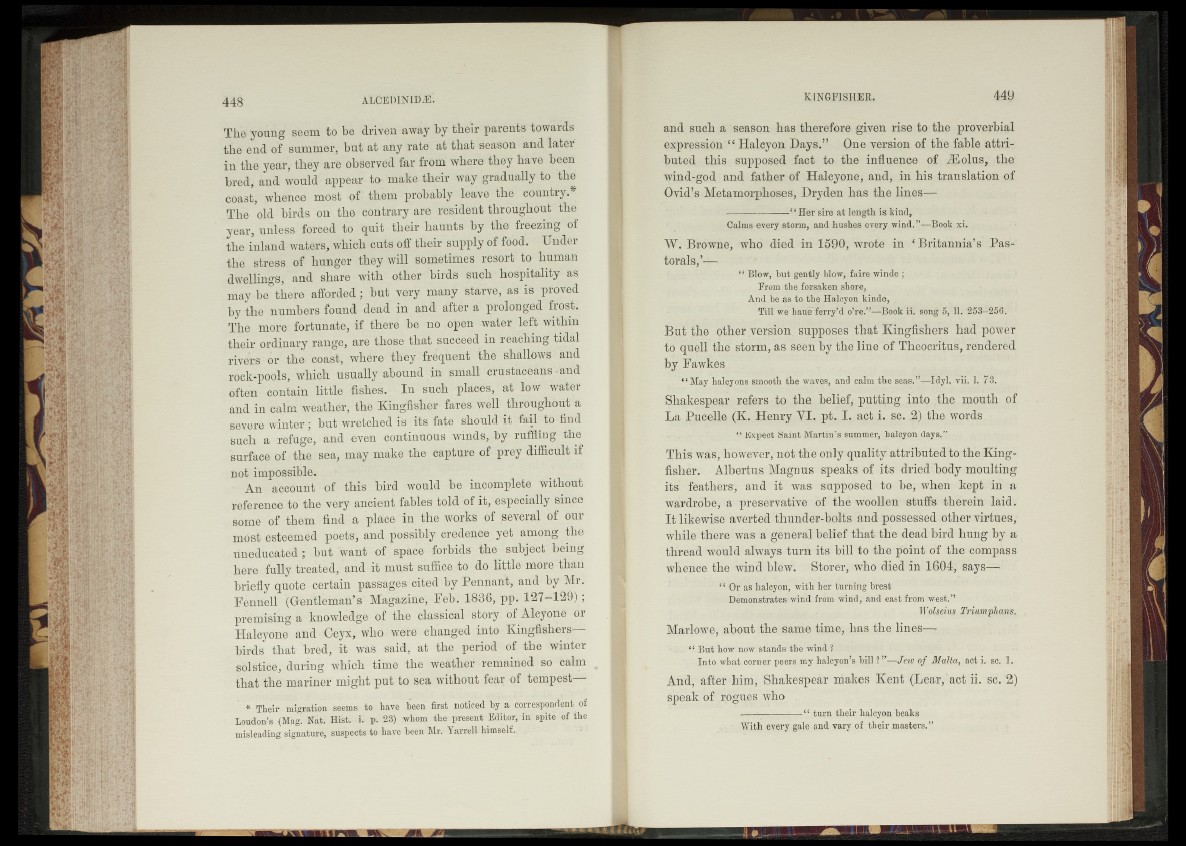
The young seem to be driven away by their parents towards
the end of summer, but at any rate at that season and latei
in the year, they are observed far from where they have been
bred, and would appear to make their way gradually to the
coast, whence most of them probably leave the country.
The old birds on the contrary are resident throughout the
year, unless forced to quit their haunts by the freezing of
the inland waters, which cuts off their supply of food. Under
the stress of hunger they will sometimes resort to human
dwellings, and share with other birds such hospitality as
may be there afforded; but very many starve, as is proved
by the numbers found dead in and after a prolonged frost.
The more fortunate, if there be no open water left within
their ordinary range, are those that succeed in reaching tidal
rivers or the coast, where they frequent the shallows and
rock-pools, which usually abound in small crustaceans-and
often contain little fishes. In such places, at low water
and in calm weather, the Kingfisher fares well throughout a
severe winter; but wretched is its fate should it fail to find
such a refuge, and even continuous winds, by ruffling the
surface of the sea, may make the capture of prey difficult if
not impossible.
An account of this bird would be incomplete without
reference to the very ancient fables told of it, especially since
some of them find a place in the works of several of our
most esteemed poets, and possibly credence yet among the
uneducated ; but want of space forbids the subject being
here fully treated, and it must suffice to do little more than
briefly quote certain passages cited by Pennant, and by Mr.
Fennell (Gentleman’s Magazine, Feb. 1886, pp. 127-129);
premising a knowledge of the classical story of Alcyone or
Halcyone and Ceyx, who were changed into Kingfishers
birds that bred, it was said, at the period of the winter
solstice, during which time the weather remained so calm
that the mariner might put to sea without fear of tempest
* Their migration seems to have been first noticed by a correspondent of
Loudon’s (Mag. Nat. Hist. i. p. 23) whom the present Editor, in spite of the
misleading signature, suspects to have been Mr. Yarrell himself.
and such a season has therefore given rise to the proverbial
expression “ Halcyon Days.” One version of the fable attributed
this supposed fact to the influence of iEolus, the
wind-god and father of Halcyone, and, in his translation of
Ovid’s Metamorphoses, Dryden has the lines—
---------- --------‘ ‘ Her sire at length is bind,
Calms every storm, and hushes every wind.”—Boob xi.
W. Browne, who died in lfi90, wrote in ‘Britannia’s Pastorals,’—
“ Blow, but gently blow, faire winde ;
From the forsaben shore,
And be as to the Halcyon binde,
Till we haue ferry’d o’re.”—Boob ii. song 5, 11. 253-256.
But the other version supposes that Kingfishers had power
to quell the storm, as seen by the line of Theocritus, rendered
by Fawkes
“ May halcyons smooth the waves, and calm the seas.”—Idyl. vii. 1. 73.
Shakespear refers to the belief, putting into the mouth of
La Pucelle (K. Henry YI. pt. I. act i. sc. 2) the words
“ Expect Saint Martin's summer, halcyon days.”
This was, however, not the only quality attributed to the Kingfisher.
Albertus Magnus speaks of its dried body moulting
its feathers, and it was supposed to be, when kept in a
wardrobe, a preservative of the woollen stuffs therein laid.
It likewise averted thunder-bolts and possessed other virtues/
while there was a general belief that the dead bird hung by a
thread would always turn its bill to the point of the compass
whence the wind blew. Storer, who died in 1604, says—■
“ Or as halcyon, with her turning brest
Demonstrates wind from wind, and east from west.”
Wolseius Triumphant,
Marlowe, about the same time, has the lines—
“ But how now stands the wind ?
Into what corner peers my halcyon’s bill ? ”—Jew o f Malta, act i. sc. 1.
And, after him, Shakespear makes Kent (Lear, act ii. sc. 2)
speak of rogues who
-----;------------- “ turn their halcyon beabs
With every gale and vary of their masters.”